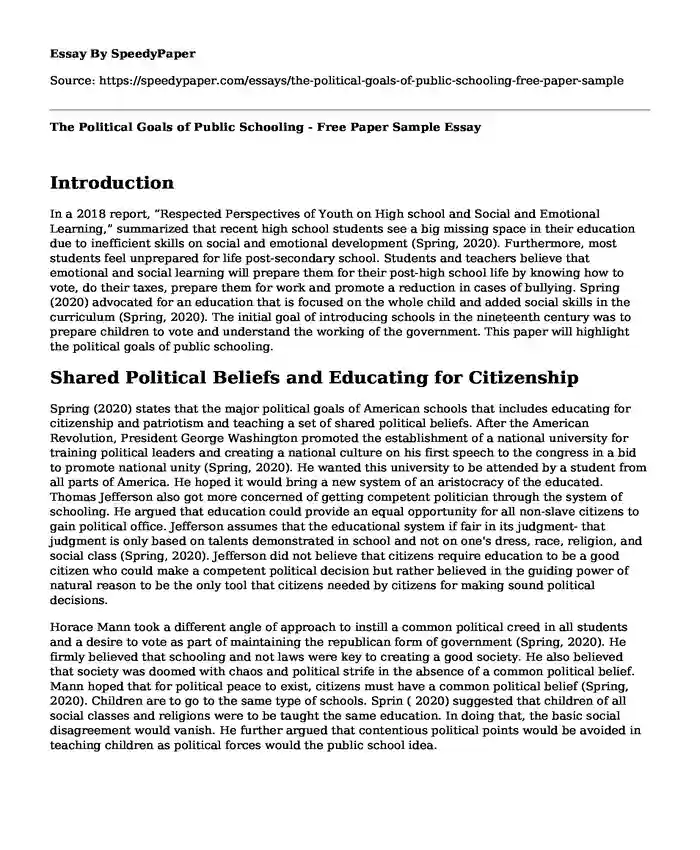
| Type of paper: | Essay |
| Categories: | Politics School Public administration |
| Pages: | 3 |
| Wordcount: | 800 words |
Introduction
In a 2018 report, “Respected Perspectives of Youth on High school and Social and Emotional Learning,” summarized that recent high school students see a big missing space in their education due to inefficient skills on social and emotional development (Spring, 2020). Furthermore, most students feel unprepared for life post-secondary school. Students and teachers believe that emotional and social learning will prepare them for their post-high school life by knowing how to vote, do their taxes, prepare them for work and promote a reduction in cases of bullying. Spring (2020) advocated for an education that is focused on the whole child and added social skills in the curriculum (Spring, 2020). The initial goal of introducing schools in the nineteenth century was to prepare children to vote and understand the working of the government. This paper will highlight the political goals of public schooling.
Shared Political Beliefs and Educating for Citizenship
Spring (2020) states that the major political goals of American schools that includes educating for citizenship and patriotism and teaching a set of shared political beliefs. After the American Revolution, President George Washington promoted the establishment of a national university for training political leaders and creating a national culture on his first speech to the congress in a bid to promote national unity (Spring, 2020). He wanted this university to be attended by a student from all parts of America. He hoped it would bring a new system of an aristocracy of the educated. Thomas Jefferson also got more concerned of getting competent politician through the system of schooling. He argued that education could provide an equal opportunity for all non-slave citizens to gain political office. Jefferson assumes that the educational system if fair in its judgment- that judgment is only based on talents demonstrated in school and not on one's dress, race, religion, and social class (Spring, 2020). Jefferson did not believe that citizens require education to be a good citizen who could make a competent political decision but rather believed in the guiding power of natural reason to be the only tool that citizens needed by citizens for making sound political decisions.
Horace Mann took a different angle of approach to instill a common political creed in all students and a desire to vote as part of maintaining the republican form of government (Spring, 2020). He firmly believed that schooling and not laws were key to creating a good society. He also believed that society was doomed with chaos and political strife in the absence of a common political belief. Mann hoped that for political peace to exist, citizens must have a common political belief (Spring, 2020). Children are to go to the same type of schools. Sprin ( 2020) suggested that children of all social classes and religions were to be taught the same education. In doing that, the basic social disagreement would vanish. He further argued that contentious political points would be avoided in teaching children as political forces would the public school idea.
Shared Political Beliefs and Patriotism
Godwin argued that teaching of political ideas in public would enable those in power to control the future by determining what should be taught and not to be taught to the future generation. In 1973 he stated that “their view as institutors of the system of education will not fail to be analogous to their views in their political capacity” (Spring, 2020).
The organizational features of the school were to instill political values through socialization. Students would learn by following school rules, engaging in school social events, and interacting with other students (Spring, 2020). Obeying school rules would translate to obeying government laws; this will ultimately result in loyalty. Johann Fichte, a Prussian leader, argued that wanted schools to conform students to obey government laws. He further argued that the real work of the school is shaping this social adjustment. A prudently organized government requires a citizen to submit their loyalty and obedience to a written constitution and law. He recommended teaching patriotic songs, national history, and literature to improve the sense of patriotism to the government (Spring, 2020).
Conclusion
In a nutshell, political education in an American school is faced by varied controversies over its persevered content. The majority of school graduates never vote despite being the central outcome of civic education. A good number of students end up as school dropouts with the concept of citizenship focused on obedience to law and authority in contrast to community activism. The overall political goals of schooling are to promote equal opportunity for all to political positions, educate patriotic citizens, to enhance the teaching of a common political belief, to emphasize voting rights, and to educate students to fully engage in community activities.
References
Spring, J. (2020). American education (19th ed., pp. 1-27). 52 Vanderbilt Avenue, New York, NY 10017: Routledge. https://www.researchgate.net/publication/266387302_Public_Policy_and_Higher_Education_Reframing_Strategies_for_Preparation_Access_and_College_Success.
Cite this page
The Political Goals of Public Schooling - Free Paper Sample. (2023, Nov 25). Retrieved from https://speedypaper.net/essays/the-political-goals-of-public-schooling-free-paper-sample
Request Removal
If you are the original author of this essay and no longer wish to have it published on the SpeedyPaper website, please click below to request its removal:
- Terrorists Behavioral Analysis, Essay Sample
- Essay Example on Prison Overcrowding: Alternatives to Incarceration in America
- Free Essay: How Cooperative Federalism Was a Response to Specific Policy Challenges
- Free Essay: What Is a Homegrown Violent Extremist?
- Remembering Jim Crow: Unveiling the Racial Discrimination of a Past Era
- Paper on Navigating the Waves: A Historical Journey and Contemporary Analysis of the U.S. Education System
- Free Paper Example on Examining the USA Patriot Act: Balancing Security and Civil Liberties
Popular categories




